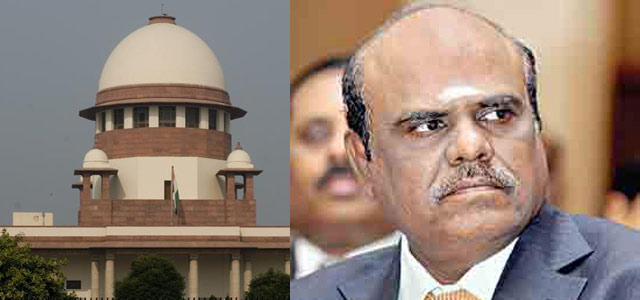
Justice C. S. Karnan on being arrested on 20 June, 2017 moved the Supreme Court seeking bail and suspension of six months sentence awarded to him on 9 May, 2017. The vacation bench of the Supreme Court consisting of Justice D.Y Chandrachud and Justice Sanjay Kishan Kaul today (i.e. 21 June, 2017) said:
“We can’t suspend the sentence as the order of the sentence was passed by a seven-judge bench.”
Besides the Court has rejected his bail plea. The following questions beg an answer:
What prevents the special bench of seven judges to hold court during vacation? Is it because some of the concerned judges being on vacation are holidaying around? Or is it because one of the seven judges has since retired and the bench cannot be constituted? Or is it because the detailed order of 9 May, 2017 has still not been prepared and signed by seven judges? In any case it is a serious development as the issue at hand is one of liberty of Justice C.S. Karnan. Is India already reeling under an undeclared emergency where liberty of the detenu comes to a naught?
In the infamous habeas corpus ruling of 1976 (ADM Jabalpur vs. Shukla) Justice Y.V. Chandrachud and three other judges ruled that “…no person has any locus standi to move any writ petition under Art 226 before a High Court for habeas corpus or any other writ or order or direction to challenge the legality of an order of detention…” The only dissenting opinion was from Justice H.R. Khanna. Have Justice D.Y. Chandrachud and Justice Sanjay Kishan Kaul in June 2017 done something akin to what Supreme Court did in habeas corpus case during the Emergency era? Are Indians living – sans their liberty – under undeclared emergency?
Since the Supreme Court is neither listening nor acting proactively it is necessary to revisit Justice Krishna Iyer’s classic treatise on bail wherein it was reiterated that bail not jail is the rule. Justice V.R. Krishna Iyer and Justice D.A. Desai through their judgement dated 31.01.1978 in Babu Singh and Others vs. The State of U.P(1978 AIR 527)gave a scientific orientation to the crucial issue of bail. These judges accepted that hitherto the ferocity of the crime had eclipsed the real purposes of bail or jail; that other sensitive and sensible circumstances were ignored, and that the fate of applicants for bail in the higher judiciary had largely hinged on the hunch of the bench as on expression of judicial discretion. Two paras need to be quoted:
“The judge even when he is free, is still not wholly free. He is not to innovate at pleasure. He is not a knight – errant roaming at will in pursuit of his own ideal of beauty or of goodness. He is to draw his inspiration from consecrated principles.” – Benjamin Cardozo
“..the discretion of a judge is the law of tyrants: it is always unknown. It is different in different men; it is casual, and depends upon constitution, temper and passion. In the best, it is often times caprice; in the worst, it is every vice, folly and passion to which human nature is liable …”- Lord Camdon
The personal liberty of an accused or convict is fundamental as enunciated in Article 21 of the Constitution of India: No person shall be deprived of his life or personal liberty except according to procedure established by law, it can be denied only by procedure “established by law”. The last four words of Article 21 are the life-force of that vital human right.
The Supreme Court of India – to salvage its credibility – should immediately constitute the special bench of seven judges and release Justice C. S. Karnan on bail.
Dr. P.S. Sahni is a member of PIL Watch Group which is campaigning on the issue of ‘bail not jail’ since 2014. Email: pilwatchgroup@gmail.com
No comments:
Post a Comment